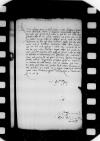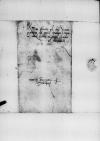List #2699
Samuel MACIEJOWSKI do Ioannes DANTISCUSPiotrków, 1544-01-20
| odebrano Heilsberg (Lidzbark Warmiński), 1544-01-27 Rękopiśmienne podstawy źródłowe:
| ||||
Tekst + aparat krytyczny + komentarzZwykły tekstTekst + komentarzTekst + aparat krytyczny
Reverendissimo in Christo Patri, domino
Reverendissime in Christo Pater et Domine, frater et amice carissime et plurimum observande.
Salutem et obsequiorum commendationem.
Nihil est, quod mihi agat gratias Reverendissima Dominatio Vestra, si quid illi aut amicis illius gratificor. Nam, ut hoc faciam, constituta iam pridem inter nos amicitia postulat. Cui ego semper, ut satisfiat, per me curabo. De
Cupio Reverendissimam Dominationem Vestram optime valere.
Vestrae Reverendissimae Paternitatis servitor


 BCz, 1599, p. 386
BCz, 1599, p. 386